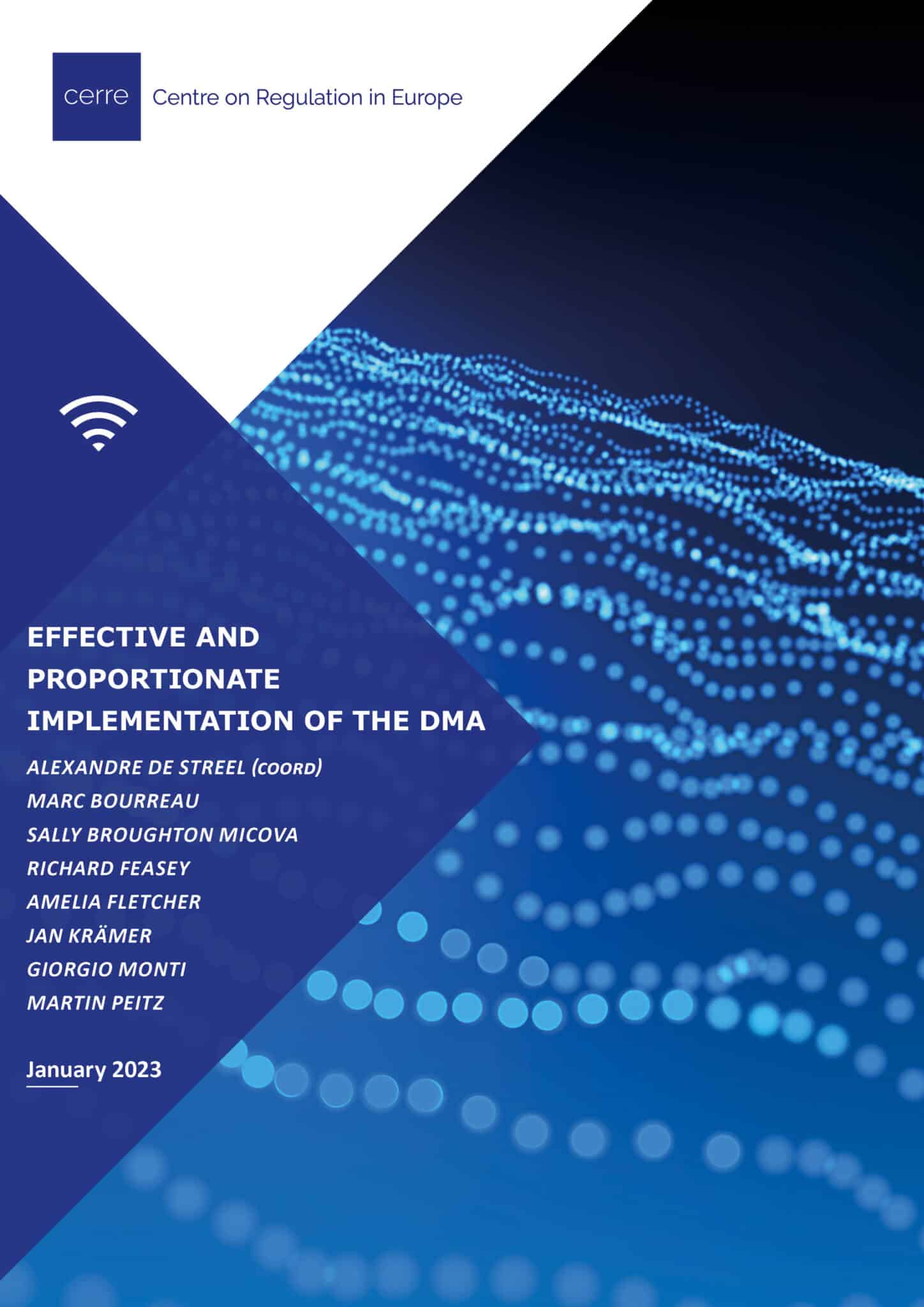The Digital Markets Act (DMA) entered into force on 1 November 2022 and its rules will apply from 2 May 2023. The Commission should designate, for the first time, the gatekeepers subjected to the rules by September 2023, and those platforms should comply with prohibitions and obligations in March 2024.
CERRE today publishes a collection of nine papers focusing on the trade-offs around the different possible interpretations of the DMA, authored by a group of leading academics in the CERRE Tech, Media, and Telecom practice. A brief overview of the chapters in this book follows below.
RECOMMENDATIONS
This chapter, coordinated by CERRE Academic Director Alexandre de Streel, provides points of attention and recommendations on how to implement the DMA. Recommendations are divided into three sections in the paper: gatekeeper designation, obligations, and institutional design.
Gatekeeper Designation
- Decisions to regulate Core Platform Services (CPS) will require a designation that the undertaking in question is a gatekeeper concerning the provision of that specific service;
- Evidential standards to exclude a firm from gatekeeper designation should be the same as those used to include firms that otherwise do not meet the same thresholds; and
- The application of Annex A to the DMA needs to be clarified through specific cases.
Obligations
- Material and geographical scope of all the obligations’ application needs to be clarified, and consistency with existing digital laws needs to be ensured;
- The precise meaning of some obligations needs to be defined;
- How compliance with obligations will be assessed and demonstrated needs to be further explained and clarified, possibly through a set of quantitative measurements.
Institutional Design
- Compliance reports should be living instruments and state, on the one hand, how gatekeepers propose to modify their conduct to be compliant and, on the other, why these measures are likely to be effective.
- The Commission should deploy an approach-based method for responsive regulation;
- The Commission should consistently monitor changing market conditions to be able to provide for adaptative enforcement.
THE DMA COMPASS
Since the DMA consists of and is establishing a new form of economic regulation in Europe, the first interpretations and enforcement decisions taken by the Commission will set the direction and tone for future interpretations and enforcement under the DMA.
Due to the fast-evolving, complex and still not fully understood technologies and business models falling within the scope of the DMA, both interpretations and decisions will be difficult to make, especially in light of the information asymmetry between the regulators and regulated platforms. Therefore the purpose of this chapter, authored by Alexandre de Streel, is to serve as both an interpretation and implementation ‘compass’ to assist gatekeepers with compliance and business users with operating in digital markets.
The following recommendations emerge in this chapter:
- Obligations can be divided into the following four categories:
- Preventing anti-competitive leverage from one service into another;
- Facilitating switching and multihoming for both business and end-users;
- Opening platforms and data; and
- Increasing transparency.
- There should be objective quantitative measurements in respect of each obligation or group of obligations;
- A ‘Managed Competition’ model is advised to stimulate both inter- and intra-platform competition.
DESIGNATION OF GATEKEEPERS
The designation of gatekeepers is not automatic as the DMA includes quantitative and qualitative criteria to guide the designation, and leaves room for different interpretations. The author of this chapter, CERRE Senior Advisor Richard Feasey, focuses on the following three questions about the designation process:
- Should there be one gatekeeper designation or multiple designations? With the conclusion that designation is done in relation to each CPS, therefore one undertaking could receive multiple designations if they are providers of multiple CPSs;
- Should the same or different standards apply to rebut the gatekeeper presumption based on quantitative thresholds? With the conclusion that it would be appropriate for the evidential standards applied in both Market Investigations in cases which meet the quantitative thresholds and those which do not, be the same, subject to the practical constraints arising from the different timescales given for the two types of investigations in the Act.
- Should anti-circumvention rules be applied? With the conclusion that the provisions in Annex A to the DMA need to be clarified through specific cases to ensure that firms do not abuse the provision to evade legislation, something which might be difficult to prove for the Commission.
DATA TRANSPARENCY REQUIREMENTS IN RELATION TO ADVERTISING
Author CERRE Academic Co-Director Sally Broughton-Micova states that the transparency provisions in the DMA have both the potential to make a significant difference in the advertising ecosystem, and also to be rendered ineffectual if the processes for granting consent are not designed in a manner which encourages transparency.
The paper concludes that:
- Crucial definitions need to be established;
- Contestability and fairness in the advertising ecosystem could be stymied by overly cumbersome processes for consent; and
- The implementation of the advertising transparency requirements in the DMA could encourage industry-wide re-evaluation of measures of value and effectiveness, together with a move away from personal data-intensive types of advertising.
DMA SWITCHING TOOLS AND CHOICE SCREENS
This chapter, penned by CERRE Research Fellow Amelia Fletcher, focuses on the provisions in the DMA that address the potential implementation problems in relation to switching tools and choice screens. The author highlights some intrinsic challenges associated with any requirements that seek to change end-user behaviour, and examines each of the provisions in more detail, highlighting questions of interpretation, and finally emphasising some possible limitations to their effectiveness.
THE PROHIBITION OF SELF-PREFERENCING IN THE DMA
In this chapter, author Martin Peitz argues that the case against self-preferencing may look clear from a theory point of view, however, its implementation connected to the DMA obligations is not without questions: what is a separate product or service, what is a third-party or a fist-party offer, and are scenarios affecting business users also included?
It can be challenging to determine the absence of self-preferencing and distinguish it from legitimate differential treatment, in particular when ranking is provided by a self-learning algorithm. The author claims that economic analysis can be a useful tool for making this distinction and providing guidance on whether the application of the prohibition is actually in line with the objectives of the DMA. Empirical analyses have shown self-preferencing might increase consumer welfare in some instances. Thus, if the DMA aims to promote fairness and contestability for the benefits of consumers, economic analysis should be taken into account to ensure that the prohibition focuses on those instances of self-preferencing that are likely to be against market contestability and the long-term interest of consumers.
DATA ACCESS PROVISIONS IN THE DMA
Author CERRE Academic Co-Director Jan Krämer zooms in on two obligations: data portability right for business users and end users, and data access provision for search engines in this chapter.
When it comes to the former, issues arise on the interpretation of what constitutes observed data (and consequently exactly what data falls under this obligation), the contextual data that needs to accompany it in order for recipients to be able to extract information, and how consent will be handled, among other relevant issues. When it comes to the latter, the tension between privacy and contestability, the scope of data to be shared (relating to the query, the search results page, and the user), who can receive access to the data, and the terms in which the access will be granted are the most relevant points of contention.
DMA – HORIZONTAL AND VERTICAL INTEROPERABILITY OBLIGATIONS
CERRE Academic Co-Director Marc Bourreau highlights multiple issues that may arise with the implementation of the interoperability obligations. Regarding horizontal interoperability, on the one hand, one should take into account the interplay between interoperability and multihoming; the geographical scope of interoperability has to be clarified; and it should be considered to apply interoperability requirements only to a subset of “basic functionalities”. Regarding vertical interoperability, the paper deals with how gatekeepers could process multiple access requests effectively; proposes solutions regarding the definition of interfaces, and offers approaches to handle concerns about security and integrity.
PROCEDURES AND INSTITUTIONS IN THE DMA
This chapter focuses on two aspects of enforcement: the supervisory architecture and the formal enforcement setup, outlined in the legislation. CERRE Research Fellow Giorgio Monti assesses the procedural rules and highlights several key takeaways for the implementation process, which include, but are not limited to:
- The Commission should issue frequently updated guidelines on the submission of compliance reports to facilitate the work of gatekeepers;
- Guidelines are required to explain how the regulatory dialogue (Article 8(3)) will be carried out;
- National Competition Authorities could discuss best practices at the European Competition Network about receiving third-party notifications under the DMA to filter complaints and concerns;
- The Commission should be responsive to the actions of the gatekeeper and either facilitate compliance (if the gatekeeper wishes to comply) or apply increasingly punitive sanctions to secure compliance.










